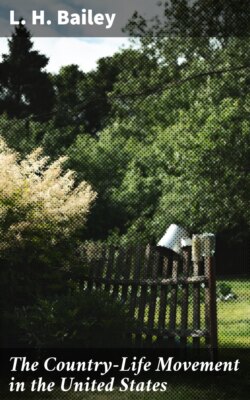Читать книгу The Country-Life Movement in the United States - L. H. Bailey - Страница 25
На сайте Литреса книга снята с продажи.
Significance of the decline.
ОглавлениеTable of Contents
It is commonly assumed that a decline in rural population in any region is itself evidence of a real decline in agriculture. This conclusion, however, does not at all follow. The shift in population as between town and country is an expression of very many causes. In some cases it may mean a lessening in economic efficiency in the region, and in some cases an actual increase in such efficiency.
It must be remembered that we have been passing from the rural to the urban phase of civilization. The census of 1900 showed approximately one-third of our people on farms or closely connected with farms, as against something like nine-tenths a hundred years previous. It is doubtful whether we have yet struck bottom, although the rural exodus may have gone too far in some regions; and we may not permanently strike bottom for some time to come.
We think of Washington, Jefferson, Monroe, and other early patriots as countrymen, and we are likely to deplore the fact that countrymen no longer represent us in high places. The fact is that "the fathers" represented all society, because society in their day was not clearly differentiated between city and country. They were at the same time countrymen and city men, but the city was the incidental or secondary interest. To-day, the conditions are reversed. The city has come to be the preponderating force, and the country is largely incidental and secondary so far as the shaping of policies is concerned; but this does not prove that a greater ratio of country population is needed. The number of persons now living in the open country is probably sufficient, if the persons were all properly effective. The real problem before the American people is how to make the country population most effective, not how to increase this population; the increase will be governed by the operation of economic law.
The sorting of our people has not yet reached its limit of approximate stability. Many persons who live on the land really are not farmers, but are the remainders of the rural phase of society.
A decline in rural population in any region may be expressive of the general adjustment as between country and city; it may mean the passing out of active cultivation of large areas of land that ought to be in forest or in extensive systems of agriculture; it may mean the moving out of well-to-do farmers to cheaper lands, as an expression of the land-hunger of the American; it may be due in some cases to the retiring of well-to-do persons from the farms to the town; and other causes are at work in particular localities. The rural population of Iowa is decreasing, but the agricultural production and land valuation are increasing.
The lessened production of live-stock, of which we have recently heard so much, is probably not due to any great extent, if at all, to decreasing rural population. It is in part due to the shift in farming following the passing of the western ranges, and in part to the lack of a free market, and in part to a changing adjustment in farming practices. This situation will take care of itself if the markets are not manipulated or controlled.
Many publicists are alarmed at the lessened production of farm products in comparison with imports, and fear that the balance of trade will be seriously turned against us, with a rise in the rate of exchange. It is not to be expected that we shall maintain our former rate of export of raw crops, nor is it desirable from the point of view of maintaining the fertility of our lands that we should do so; but the maintenance of production is now to depend on farming every acre better, in larger farms as well as in smaller farms, rather than on taking up new acres.
The ultimate importance of agriculture to civilization, in other words, lies not in the number of persons it supports, but in the fact that it must continue to provide supplies for the populations of the earth when mining and exploitation are done, when there are no new lands, and when we shall have taken away all the first flush of the earth's bounty. The character of the farm man, therefore, becomes of supreme importance, and all the institutions of society must lend themselves to this personal problem.
We shall never again be a rural people. We want the cities to grow; and as they grow they should learn how to manage themselves. How they shall meet their questions of population is not my problem; and I have no suggestions to make on that subject.
